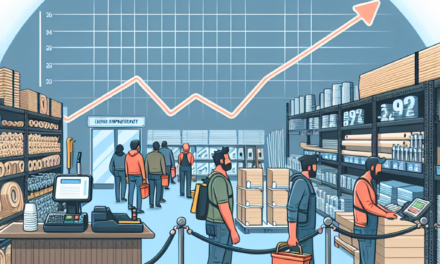“Seize the Opportunity: Is Costco’s Ascent Your Next Smart Investment?”
Introduction
As Costco continues to reach new heights in its stock performance, investors are left pondering whether it is still a viable opportunity for investment. With its strong business model, consistent revenue growth, and expanding membership base, Costco has established itself as a leader in the retail sector. However, as the stock price climbs, potential investors must weigh the risks and rewards of entering the market at this stage. This analysis will explore the factors influencing Costco’s stock trajectory, the implications of its current valuation, and whether it is too late to capitalize on the company’s success.
Current Performance of Costco Stock
As of late 2023, Costco’s stock has been experiencing a remarkable surge, reaching new heights that have captured the attention of investors and analysts alike. This upward trajectory can be attributed to several factors, including the company’s robust business model, consistent revenue growth, and a loyal customer base that continues to expand. With these elements in play, many potential investors are left wondering whether it is too late to enter the market and capitalize on Costco’s success.
To begin with, Costco’s performance in the retail sector has been nothing short of impressive. The company has consistently reported strong earnings, driven by its unique membership-based model that fosters customer loyalty and encourages repeat business. This model not only provides a steady stream of revenue from membership fees but also allows Costco to offer competitive prices on a wide range of products. As a result, the company has been able to maintain healthy profit margins, even in a challenging economic environment characterized by inflation and supply chain disruptions.
Moreover, Costco’s ability to adapt to changing consumer preferences has further solidified its position in the market. The company has embraced e-commerce, enhancing its online shopping experience and expanding its delivery options. This strategic move has allowed Costco to tap into the growing demand for convenience, particularly among younger consumers who prioritize online shopping. By investing in technology and logistics, Costco has successfully integrated its brick-and-mortar stores with its digital platform, thereby increasing its overall market reach.
In addition to its operational strengths, Costco’s financial health is another critical factor that potential investors should consider. The company has maintained a strong balance sheet, characterized by low debt levels and substantial cash reserves. This financial stability not only provides Costco with the flexibility to invest in growth opportunities but also positions it well to weather economic downturns. Furthermore, Costco’s commitment to returning value to shareholders through dividends and share buybacks underscores its confidence in long-term growth prospects.
However, as Costco’s stock price continues to climb, some investors may be hesitant to enter the market, fearing that they may have missed the opportunity for significant gains. It is essential to recognize that while the stock has reached new heights, the company’s fundamentals remain strong. Analysts often emphasize the importance of evaluating a company’s long-term growth potential rather than focusing solely on short-term price movements. In this context, Costco’s consistent performance and strategic initiatives suggest that it may still offer attractive investment opportunities.
Additionally, it is worth noting that the retail landscape is continually evolving, and Costco’s ability to innovate and adapt will be crucial in maintaining its competitive edge. As consumer preferences shift and new market challenges arise, the company’s management team has demonstrated a proactive approach to addressing these changes. This adaptability not only enhances Costco’s resilience but also positions it favorably for future growth.
In conclusion, while Costco’s stock has reached new heights, the company’s strong fundamentals, financial health, and strategic initiatives indicate that it may not be too late to invest. Potential investors should consider the long-term growth potential of Costco, as well as the company’s ability to navigate the ever-changing retail landscape. Ultimately, those who take a measured approach to investing in Costco may find that the company’s continued success offers a compelling opportunity for growth in their portfolios.
Historical Growth Trends of Costco
Costco has long been recognized as a retail giant, and its historical growth trends provide valuable insights into its potential for future performance. Established in 1983, the company has consistently demonstrated a robust business model characterized by membership-based wholesale pricing, which has attracted a loyal customer base. Over the years, Costco has expanded its footprint, both domestically and internationally, leading to significant revenue growth. This expansion has been complemented by a strategic focus on enhancing the shopping experience, which includes a diverse product range, high-quality goods, and competitive pricing.
One of the most notable aspects of Costco’s growth is its ability to maintain a steady increase in membership numbers. The company has cultivated a strong membership renewal rate, often exceeding 90%. This loyalty not only provides a stable revenue stream but also reflects customer satisfaction with the value proposition offered by Costco. As the membership base grows, so does the purchasing power of the company, allowing it to negotiate better deals with suppliers and pass on savings to its customers. This cycle of growth has been a critical driver of Costco’s historical performance.
Moreover, Costco’s financial metrics reveal a consistent upward trajectory. Over the past decade, the company has reported impressive revenue growth, often outpacing many of its competitors in the retail sector. This growth can be attributed to several factors, including the company’s ability to adapt to changing consumer preferences and its commitment to e-commerce. As online shopping gained prominence, Costco invested in its digital infrastructure, enhancing its online shopping experience and expanding its delivery options. This strategic pivot not only attracted new customers but also retained existing ones, further solidifying its market position.
In addition to revenue growth, Costco has demonstrated resilience in its profitability metrics. The company’s operating margins have remained relatively stable, a testament to its efficient cost management practices. By keeping operational costs low while providing high-quality products, Costco has been able to maintain its competitive edge. Furthermore, the company’s focus on private-label products, particularly the Kirkland Signature brand, has contributed to higher profit margins. These products often offer better value to customers while generating higher returns for the company.
As Costco continues to evolve, it has also embraced sustainability and social responsibility, which have become increasingly important to consumers. The company’s commitment to ethical sourcing, waste reduction, and energy efficiency resonates with a growing demographic that prioritizes corporate responsibility. This alignment with consumer values not only enhances brand loyalty but also positions Costco favorably in a competitive retail landscape.
In light of these historical growth trends, potential investors may wonder about the implications for Costco’s stock performance as it reaches new heights. While the company’s past success is indicative of its strong fundamentals, it is essential to consider market conditions and future growth prospects. The retail environment is constantly changing, influenced by economic factors, consumer behavior, and technological advancements. Therefore, while Costco’s historical performance is impressive, prospective investors should conduct thorough research and consider both the opportunities and challenges that lie ahead.
In conclusion, Costco’s historical growth trends reveal a company that has successfully navigated the complexities of the retail landscape. Its ability to adapt, innovate, and maintain customer loyalty has positioned it as a formidable player in the industry. As the stock reaches new heights, understanding these trends can provide valuable context for evaluating its future potential.
Expert Opinions on Costco’s Future
As Costco continues to reach new heights in its stock performance, investors are left pondering the implications for future investment opportunities. Expert opinions on Costco’s trajectory reveal a nuanced perspective that balances optimism with caution. Analysts have noted that Costco’s business model, characterized by its membership-based structure and focus on bulk sales, has proven resilient even in challenging economic climates. This resilience is largely attributed to the company’s ability to offer value to consumers, particularly during periods of inflation when shoppers seek cost-effective alternatives.
Moreover, experts highlight Costco’s strategic expansion into e-commerce as a significant factor contributing to its growth. The pandemic accelerated the shift towards online shopping, and Costco has adeptly adapted to this trend by enhancing its digital platform. Analysts suggest that this move not only broadens Costco’s customer base but also positions the company favorably against competitors who may struggle to keep pace with the evolving retail landscape. As a result, many experts believe that Costco’s commitment to innovation and customer satisfaction will continue to drive its stock performance in the foreseeable future.
However, while the outlook appears promising, some analysts urge caution. They point out that Costco’s stock has experienced substantial appreciation, raising concerns about potential overvaluation. The price-to-earnings ratio, a common metric used to assess stock valuation, has climbed significantly, leading some experts to question whether the current price accurately reflects the company’s long-term growth potential. This sentiment is echoed by those who emphasize the importance of conducting thorough due diligence before making investment decisions, particularly in a market characterized by volatility and uncertainty.
In addition to valuation concerns, experts also consider external factors that could impact Costco’s future performance. For instance, shifts in consumer behavior, economic downturns, or changes in trade policies could pose challenges for the company. Furthermore, as competition intensifies within the retail sector, particularly from discount retailers and online giants, Costco may need to continuously innovate to maintain its competitive edge. Analysts suggest that while Costco has a strong track record, it must remain vigilant and responsive to market dynamics to sustain its growth trajectory.
Despite these challenges, many experts remain bullish on Costco’s long-term prospects. They argue that the company’s strong brand loyalty, coupled with its ability to adapt to changing consumer preferences, positions it well for continued success. Additionally, Costco’s robust financial health, characterized by consistent revenue growth and strong cash flow, provides a solid foundation for future investments. This financial stability allows the company to invest in new initiatives, such as expanding its product offerings and enhancing its supply chain efficiency.
In conclusion, while the question of whether it is too late to invest in Costco stock remains complex, expert opinions suggest a balanced view. The company’s strong fundamentals and strategic initiatives indicate a promising future, yet potential risks and valuation concerns warrant careful consideration. Investors are encouraged to weigh these factors thoughtfully, recognizing that while Costco has demonstrated remarkable resilience and adaptability, the ever-changing market landscape necessitates a prudent approach to investment. Ultimately, those considering an investment in Costco should remain informed and vigilant, as the company’s journey continues to unfold in an increasingly competitive environment.
Comparison with Competitors in Retail
As Costco continues to reach new heights in its stock performance, investors are increasingly scrutinizing its position within the retail sector, particularly in comparison to its competitors. The retail landscape is characterized by a diverse array of players, each vying for market share, yet Costco has managed to carve out a unique niche that sets it apart. To understand whether it is too late to invest in Costco stock, it is essential to examine how it stacks up against its rivals, such as Walmart, Target, and Amazon.
Costco operates on a membership-based model, which not only fosters customer loyalty but also generates a steady stream of revenue from membership fees. This model contrasts sharply with traditional retailers like Walmart and Target, which rely heavily on volume sales and promotional pricing strategies. While Walmart has a vast network of stores and a strong online presence, Costco’s focus on bulk purchasing and limited selection allows it to maintain lower prices on high-quality goods. This operational efficiency has enabled Costco to achieve impressive sales growth, even in a competitive environment where price wars are common.
Moreover, Costco’s ability to adapt to changing consumer preferences has further solidified its market position. In recent years, there has been a significant shift towards e-commerce, with Amazon leading the charge. However, Costco has successfully integrated online shopping into its business model, offering delivery and curbside pickup options that appeal to modern consumers. This adaptability not only enhances customer convenience but also positions Costco favorably against Amazon, which, despite its dominance in online retail, faces challenges in the grocery sector. Costco’s reputation for quality and value in fresh produce and perishables gives it a competitive edge that is difficult for Amazon to replicate.
In addition to its operational strategies, Costco’s financial health is another critical factor that investors should consider. The company has consistently reported strong earnings and revenue growth, which is indicative of its robust business model. In contrast, some of its competitors have struggled with profitability, particularly during economic downturns. For instance, while Walmart has faced challenges in maintaining margins due to rising labor costs and supply chain disruptions, Costco has managed to keep its costs in check, thanks in part to its efficient inventory management and strong supplier relationships. This financial resilience positions Costco as a more stable investment option compared to some of its peers.
Furthermore, the company’s commitment to providing value to its members has resulted in a loyal customer base that continues to grow. This loyalty is reflected in Costco’s impressive membership renewal rates, which hover around 90%. In comparison, retailers like Target have experienced fluctuations in customer loyalty, particularly as they navigate the complexities of omnichannel retailing. The strength of Costco’s membership model not only drives sales but also creates a sense of community among its shoppers, further enhancing its competitive advantage.
In conclusion, while Costco’s stock may be reaching new heights, its unique business model, financial stability, and strong customer loyalty suggest that it remains a formidable player in the retail sector. When compared to competitors like Walmart, Target, and Amazon, Costco’s ability to adapt to market changes and maintain profitability positions it favorably for future growth. Therefore, for investors contemplating whether it is too late to invest in Costco stock, the evidence indicates that the company is well-equipped to navigate the challenges of the retail landscape, making it a compelling option for those seeking long-term investment opportunities.
Risks of Investing in High-Performing Stocks
Investing in high-performing stocks can be an enticing prospect, particularly when companies like Costco reach new heights in their market valuations. However, while the allure of potential gains is strong, it is essential to consider the inherent risks associated with investing in stocks that have already demonstrated significant performance. One of the primary concerns is the possibility of overvaluation. As a stock’s price climbs, it may become detached from its underlying fundamentals, leading to a situation where investors are paying a premium that does not reflect the company’s actual financial health or growth prospects. This disconnect can result in a sharp correction if the market recalibrates its expectations, leaving latecomers to the investment with substantial losses.
Moreover, high-performing stocks often attract a great deal of attention from analysts and media, which can create a herd mentality among investors. This phenomenon can lead to inflated prices driven more by sentiment than by sound financial analysis. When a stock is widely regarded as a “must-have” investment, it can create a bubble that is vulnerable to bursting. Consequently, investors who enter the market during such euphoric periods may find themselves facing significant volatility and uncertainty, particularly if the stock’s performance does not meet the heightened expectations.
In addition to the risk of overvaluation and market sentiment, high-performing stocks can also be subject to increased scrutiny from regulators and analysts. As a company grows and its stock price rises, it may attract more attention from watchdog organizations, which can lead to investigations or regulatory challenges. Such scrutiny can create uncertainty around the company’s future performance and may negatively impact investor confidence. For instance, if a high-performing company faces allegations of unethical practices or financial mismanagement, the resulting fallout can lead to a rapid decline in stock price, leaving investors vulnerable to losses.
Furthermore, the competitive landscape in which high-performing companies operate can change rapidly. While Costco has established itself as a leader in the retail sector, it is not immune to the threats posed by emerging competitors or shifts in consumer behavior. The retail industry is particularly susceptible to changes in technology and consumer preferences, which can disrupt established business models. If Costco fails to adapt to these changes effectively, its growth trajectory may falter, leading to a decline in stock performance that could catch late investors off guard.
Additionally, macroeconomic factors can play a significant role in the performance of high-flying stocks. Economic downturns, rising interest rates, or changes in consumer spending habits can all impact a company’s profitability and, consequently, its stock price. Investors who enter the market during a period of strong performance may not fully account for the potential impact of these external factors, which can lead to unexpected losses.
In conclusion, while investing in high-performing stocks like Costco can offer the promise of substantial returns, it is crucial for investors to remain vigilant about the associated risks. Overvaluation, market sentiment, regulatory scrutiny, competitive pressures, and macroeconomic factors all pose significant challenges that can undermine the stability of such investments. Therefore, potential investors should conduct thorough research and consider their risk tolerance before committing to stocks that have already reached impressive heights. By doing so, they can make more informed decisions and better navigate the complexities of the stock market.
Long-Term vs. Short-Term Investment Strategies
When considering whether to invest in Costco stock as it reaches new heights, it is essential to evaluate the differences between long-term and short-term investment strategies. Each approach has its own merits and drawbacks, and understanding these can help investors make informed decisions. Long-term investment strategies typically focus on the potential for sustained growth over an extended period, often years or even decades. Investors who adopt this strategy tend to look for companies with strong fundamentals, solid management, and a competitive edge in their industry. In the case of Costco, its consistent revenue growth, loyal customer base, and effective business model make it an attractive candidate for long-term investment.
On the other hand, short-term investment strategies are characterized by a focus on quick gains, often involving the buying and selling of stocks within a matter of days or weeks. This approach can be appealing for those looking to capitalize on market volatility or specific events that may drive stock prices up or down. However, short-term investing requires a keen understanding of market trends and a willingness to accept higher risks. As Costco’s stock reaches new heights, short-term investors may be tempted to jump in, hoping to ride the wave of momentum. Yet, this strategy can be fraught with uncertainty, as market fluctuations can be unpredictable.
Transitioning from one strategy to another can also be a consideration for investors. For instance, an individual may start with a short-term approach, taking advantage of immediate price movements, but later decide to hold onto their shares for the long term if they believe in the company’s future prospects. This shift can be particularly relevant in the case of Costco, where the company’s strong fundamentals may encourage investors to reconsider their initial short-term outlook. Conversely, long-term investors may find themselves tempted to take profits if the stock experiences a significant surge, leading to a potential reevaluation of their investment strategy.
Moreover, the decision to invest in Costco stock should also take into account the broader economic environment. Factors such as interest rates, inflation, and consumer spending can significantly impact the retail sector. For long-term investors, these macroeconomic indicators are crucial, as they can influence the overall growth trajectory of the company. In contrast, short-term investors may be more focused on immediate news and events that could affect stock prices in the near term. This divergence in focus highlights the importance of aligning one’s investment strategy with personal financial goals and risk tolerance.
Ultimately, whether it is too late to invest in Costco stock depends on the investor’s individual strategy and outlook. Long-term investors may view the current price as a reflection of the company’s strong performance and future potential, while short-term investors might be wary of entering at a peak. It is essential for each investor to conduct thorough research and consider their financial objectives before making a decision. By weighing the advantages and disadvantages of both long-term and short-term strategies, investors can better navigate the complexities of the stock market and determine the most suitable approach for their unique circumstances. In conclusion, the choice between long-term and short-term investment strategies is not merely about timing but rather about aligning one’s investment philosophy with personal goals and market realities.
Analyzing Costco’s Financial Health and Valuation
As Costco continues to reach new heights in its stock performance, investors are increasingly scrutinizing the company’s financial health and valuation to determine whether it is still a viable investment opportunity. To assess Costco’s financial standing, one must consider several key metrics, including revenue growth, profit margins, and overall market position. Over the past few years, Costco has demonstrated impressive revenue growth, consistently outperforming many of its competitors in the retail sector. This growth can be attributed to a combination of factors, including its membership-based business model, which fosters customer loyalty and encourages repeat purchases.
Moreover, Costco’s ability to maintain low prices while offering high-quality products has solidified its reputation as a go-to retailer for consumers seeking value. This competitive advantage is reflected in the company’s robust profit margins, which have remained stable even in the face of rising inflation and supply chain challenges. By effectively managing its operating costs and leveraging economies of scale, Costco has been able to sustain its profitability, making it an attractive option for investors looking for stability in a volatile market.
In addition to revenue and profit margins, it is essential to examine Costco’s balance sheet to gain a comprehensive understanding of its financial health. The company boasts a strong balance sheet characterized by low debt levels and ample liquidity. This financial strength not only provides Costco with the flexibility to invest in growth opportunities but also positions it well to weather economic downturns. Furthermore, Costco’s commitment to returning value to shareholders through dividends and share repurchases underscores its confidence in long-term growth prospects.
Transitioning from financial health to valuation, it is crucial to consider how Costco’s stock is priced relative to its earnings and growth potential. The price-to-earnings (P/E) ratio is a commonly used metric for evaluating stock valuation, and Costco’s P/E ratio has historically been higher than that of many of its peers. While a high P/E ratio may raise concerns about overvaluation, it is essential to recognize that Costco’s premium valuation is often justified by its consistent performance and growth trajectory. Investors are typically willing to pay a premium for companies that demonstrate strong fundamentals and a solid growth outlook.
Moreover, analysts often employ discounted cash flow (DCF) analysis to estimate the intrinsic value of a stock. By projecting future cash flows and discounting them back to their present value, investors can gain insights into whether a stock is undervalued or overvalued. In Costco’s case, many analysts believe that the company’s growth potential, driven by expanding e-commerce capabilities and international market penetration, supports a higher valuation. As such, while Costco’s stock may appear expensive on the surface, its underlying fundamentals suggest that it could still offer attractive returns in the long run.
In conclusion, analyzing Costco’s financial health and valuation reveals a company that is not only performing well but also possesses the attributes of a strong investment. With its solid revenue growth, stable profit margins, and robust balance sheet, Costco stands out as a resilient player in the retail sector. Although its stock may be trading at a premium, the company’s growth potential and commitment to shareholder value make it a compelling option for investors considering whether it is too late to invest in Costco stock. Ultimately, the decision to invest should be based on individual risk tolerance and investment goals, but Costco’s fundamentals certainly warrant careful consideration.
Q&A
1. **Question:** Is Costco stock currently at an all-time high?
**Answer:** Yes, Costco stock has recently reached new all-time highs.
2. **Question:** What factors contribute to Costco’s stock performance?
**Answer:** Factors include strong sales growth, membership renewals, and effective cost management.
3. **Question:** Is Costco considered a stable investment?
**Answer:** Yes, Costco is generally viewed as a stable investment due to its consistent revenue and profitability.
4. **Question:** What are the risks of investing in Costco at its current price?
**Answer:** Risks include market volatility, potential economic downturns, and increased competition.
5. **Question:** How does Costco’s valuation compare to its historical averages?
**Answer:** Costco’s current valuation may be higher than historical averages, which could indicate overvaluation.
6. **Question:** Should investors consider the long-term growth potential of Costco?
**Answer:** Yes, long-term growth potential remains strong due to expansion plans and increasing membership.
7. **Question:** Is it advisable to wait for a market correction before investing in Costco?
**Answer:** Some investors may prefer to wait for a market correction to buy at a lower price, while others may choose to invest now for long-term gains.
Conclusion
Investing in Costco stock at its current heights may still be viable for long-term investors, given the company’s strong fundamentals, consistent growth, and robust business model. However, potential investors should carefully consider market conditions, valuation metrics, and their own investment strategy before making a decision. Ultimately, while the stock may seem expensive, Costco’s resilience and growth potential could justify the investment for those with a long-term perspective.





